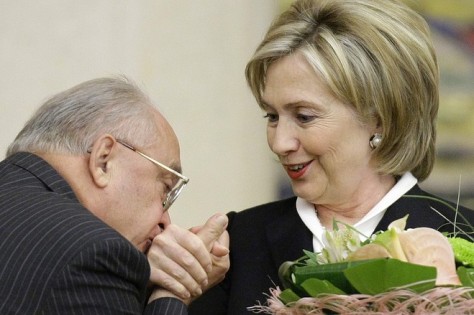Today we received a flaming comment in reaction to our 2012 post Study in Russia! A cheap way to get international education, see the world and become an expert on one of the world’s Developing Shumbas. One EarthLord was claiming that RACUS, a group of more than 15 Russian universities, featured in the post by Andy Kozlov:
is banned from most top Russian Universities due to their fraudulent activities and hence can send students to only small substandard Universities with some exceptions. The writer [of the Steppes in Sync post] is an employee of this company [here, RACUS is probably meant. The statement is simply not true]. Please be careful when contacting this organization and do not pay them any money unless you reach here in Russia and pay directly to the University. If they do not agree to this, you know there is something wrong. Contact the University directly or some other organization.
We are constantly advocating media literacy among our readers. If our posts are explicitly sponsored, we will let you know. Besides, we always leave it at the reader’s discretion to make sure their security and well-being are observed. The final decision that they make about whether to deal with RACUS or any other institution/person featured in our stories has to be theirs. To further assist our reader, we decided to search the web for signs of any fraudulent activities by RACUS. Instead, the search returned a favorable article from 2013 in South Africa’s City Press.
While doing this search, we stumbled on recent stats of foreign students studying in Russia. And, interestingly, China. Not surprisingly, these two BRICS nations are on a competition path.

(Source: Pool/Getty Images AsiaPac)
Some of the data is from previous years but the stats were conveniently packaged into one article by Kester Kenn Klomegah, a freelance journalist and an independent researcher on both Russia and China’s engagement with Africa, published by Pambazuka News in March 2014.
One of the most widely observed international higher-education ratings, QS publishes the results in key media around the world, including US News & World Report in the United States and Chosun Ilbo in Korea. Last year was the first time that the annual QS World University Rankings included a separate ranking for the BRICS countries: Brazil, Russia, India, China and South Africa.
China’s universities are occupying seven of the top 10 slots and 40 of the top 100.

19 Russian universities made the BRICS ranking’s top 100 list, though Moscow State University (MGU) was the only one to finish in the Top 10. Only 16 universities in India made the Top 100, along with 17 schools in Brazil and eight universities in South Africa.
Recently, Russian government has allocated more than USD1 billion to raise the prestige of getting a Russian education.
The Rossiyskaya Gazeta, a widely circulated Russian daily, reported in September 2013 that 40 leading Russian universities, including Moscow State University and St. Petersburg State University, will need about 6,000 lecturers from abroad. The number of foreign teachers in the country’s universities is currently significantly small and consequently does not help boast the institutions prestige. As far back as in April 2011, a new law that was passed by Russia’s Federation Council and State Duma allows the employment of foreign experts as teachers at Russian colleges and universities.
Russia is in ninth place globally in terms of the number of its own students studying abroad.
According to Russia’s education minister Dmitry Livanov, as of December 2013, there were about 100,000 foreign students studying in Russia.
Two Chinese universities – Tsinghua and Peking – took the top slots over Russia’s third-placed Moscow State University in the QS University Rankings category for the BRICS nations.
Foreign countries are afraid of sending their students to Russia, and this is a serious barrier
said Viktor Sadovnichy, the head of Moscow State University, an institution that currently educates some 5,000 foreign students.
But, there are educational institutions in some safe locations for foreigners. As Valeria Antonova, press secretary for the Peoples’ Friendship University of Russia (former Patrice Lumumba Friendship University, established in 1960), explained to Kester Kenn Klomegah, the university approximately has foreigners from over 100 countries. It has a total 1,100 African students and boasts one of the best campuses in Russia: residential and academic buildings are located in the same area, all within walking distance.
‘While on vacation, many foreign students can look for jobs. From this year, all international students are eligible to work in the country. The Peoples’ Friendship University of Russia is developing new approaches to employment of foreign students. Now, we can talk about the active expansion of the network of employers willing to accept foreign citizens, including Africans,’ Antonova said.
See related
On Branding: products and.. places
On how to globalize one’s business
Africa-Asia prospects II: more solid research on Africa needed to inform Sino-African relations
Educating future Okonjo-Iwealas: a potrait of Nigeria’s Another Ngozi
A rookie’s take on Russia’s creative industries
South African training for Ukrainians
Being blind in Zimbabwe in a global digital age
On Newsworthiness: the BBC’s ‘Stadiums of Hate’ and Monsanto-s biotechnology for The Onion
Advertising trends in Southern Africa and beyond
Making sure that Zimbabwe reads II: from Boston via Beira to Harare
How Ukraine is providing the world with high-end IT solutions. Via Uruguay’s Montevideo
What you can learn about doing business with Africa, at Kyiv Post Employment Fair
How culture contributes to development: an UNESCO indicator suite
Whose premise: UNESCO-Harare or UNESCO-Paris?
Taiwanese: Taiwan better suited than the mainland to export Chinese culture
